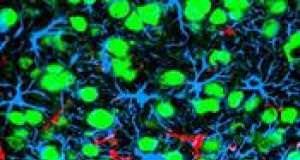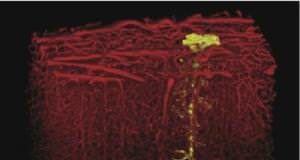Losing Weight Sooner Gives Best Chance Of Reversing Heart Damage, Study...
In a study of the impact of weight loss on reversing heart damage from obesity, Johns Hopkins researchers found that poor heart function in young obese mice can be reversed when the animals lose weight from a low-calorie diet. However, older mice, who had been obese for a longer period of time, did not regain better heart function after they were on the same low-calorie diet.
Triple Mix Of Blood Pressure Drugs And Painkillers Linked To Kidney...
Patients who take a triple combination of blood pressure drugs and common painkillers are at an increased risk of serious kidney problems, especially at the start of treatment, finds a new study published on the British Medical Journal website.
Brain Damage Triggered By Mini-Strokes Detailed
A new study appearing December 12 in the Journal of Neuroscience details for the first time how "mini-strokes" cause prolonged periods of brain damage and result in cognitive impairment. These strokes, which are often imperceptible, are common in older adults and are believed to contribute to dementia.
Even The Smallest Stroke Can Damage Brain Tissue And Impair Cognitive...
Blocking a single tiny blood vessel in the brain can harm neural tissue and even alter behavior, a new study from the University of California, San Diego has shown. But these consequences can be mitigated by a drug already in use, suggesting treatment that could slow the progress of dementia associated with cumulative damage to miniscule blood vessels that feed brain cells.
The team reports their results in the Dec. 16 advance online edition of Nature Neuroscience.
Silent Stroke Can Cause Parkinson’s Disease
Scientists at The University of Manchester have for the first time identified why a patient who appears outwardly healthy may develop Parkinson's disease.
Whilst conditions such as a severe stroke have been linked to the disease, for many sufferers the tremors and other symptoms of Parkinson's disease can appear to come out of the blue. Researchers at the university's Faculty of Life Sciences have now discovered that a small stroke, also known as a silent stroke, can cause Parkinson's disease. Their findings have been published in the journal Brain, Behavior, and Immunity.
Don’t Forget To Screen For Diabetes In CAD Patients, Says European...
While it is well recognized that patients with diabetes are at risk of developing Coronary Artery Disease (CAD), on World Diabetes Day, the European Society of Cardiology (ESC) highlights the fact that patients with CAD are also at great risk of developing diabetes mellitus (DM).
No Link Found Between Calcium Intake And Coronary Artery Calcification
Researchers at the Institute for Aging Research (IFAR) at Hebrew SeniorLife, an affiliate of Harvard Medical School (HMS), have published a study that shows no evidence of a link between calcium intake and coronary artery calcification, reassuring adults who take calcium supplements for bone health that the supplements do not appear to result in the development of calcification of blood vessels.
Metformin Offers Cardio Benefits Over Sulfonylureas In Diabetes, Study Suggests
A Vanderbilt study examining the impact of the two most commonly prescribed oral diabetes medications on the risk for heart attack, stroke and death has found the drug metformin has benefits over sulfonylurea drugs.
It was important to examine the cardiovascular impact of the more commonly used diabetes drugs after recent controversy surrounded another diabetes medication, rosiglitazone, because it was associated with an increased cardiac risk, said lead author, Christianne L. Roumie, M.D., MPH, assistant professor of Internal Medicine and Pediatrics. Smaller studies pointed to a potential advantage of taking the drug metformin but this study confirms this in a large population.
Telltale Visible Signs Of Aging May Predict Heart Disease
If you look old, your heart may feel old, according to research presented at the American Heart Association's Scientific Sessions 2012.In a new study, those who had three to four aging signs - receding hairline at the temples, baldness at the head's crown, earlobe crease, or yellow fatty deposits around the eyelid (xanthelasmata) -- had a 57 percent increased risk for heart attack and a 39 percent increased risk for heart disease .
Every Single Junk Food Meal Damages Your Arteries, New Study Reveals
A single junk food meal -- composed mainly of saturated fat -- is detrimental to the health of the arteries, while no damage occurs after consuming a Mediterranean meal rich in good fats such as mono-and polyunsaturated fatty acids, according to researchers at the University of Montreal-affiliated ÉPIC Center of the Montreal Heart Institute. The Mediterranean meal may even have a positive effect on the arteries.
Research Findings Breathe New Life Into Lung Disease
It turns out the muscle cells on the outside of blood vessels have been wrongly accused for instigating lung disease. New research shows that while these muscle cells are responsible for constricting or dilating the blood vessels, they are not responsible for sensing the amount of oxygen that gets to the lungs. That message comes from the endothelial cells -- special cells that line the blood vessels -- along a "signalling pathway."
An Apple A Day Lowers Level Of Blood Chemical Linked To...
Eating an apple a day might in fact help keep the cardiologist away, new research suggests. In a study of healthy, middle-aged adults, consumption of one apple a day for four weeks lowered by 40 percent blood levels of a substance linked to hardening of the arteries.


















